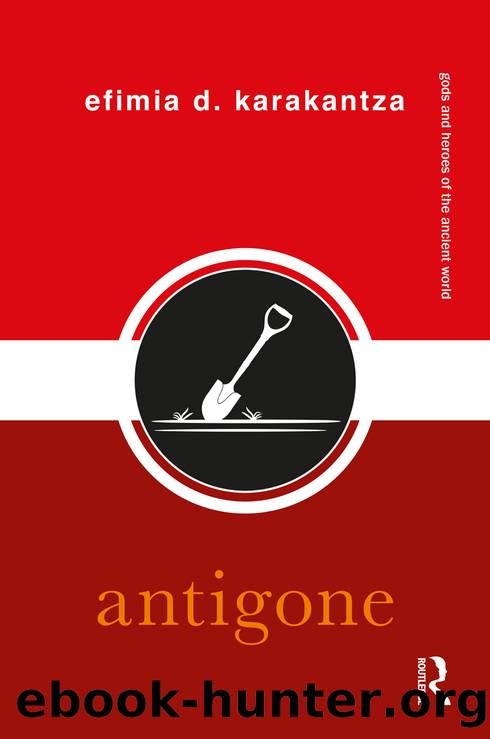Antigone by Efimia D. Karakantza;

Author:Efimia D. Karakantza;
Language: eng
Format: epub
Publisher: Taylor & Francis (Unlimited)
Published: 2022-11-24T00:00:00+00:00
But what is this âeffect of beauty on desireâ, as Lacan puts it? Which beauty, and which desire? The beauty of Antigone, despite its âphysicalityâ, derives âfrom the relation of the heroine to the limitâ; this relation is, in the case of Antigone, the transgression of her atê.40 Atê in classical thought is the mental blindness or delusion that gods send to mortals when they wish to destroy them â often as a punishment for their hybris (recklessness). This blindness makes them incapable of âseeingâ the consequences of an action they are about to perform. In some cases, atê means simply a âcalamityâ, âruinâ, âdoomâ. For Lacan, however, it âdesignates the limit that human life can only briefly crossâ.41 This is an idiosyncratic understanding of a controversial passage (Antigone 614), where the chorus gnomically states that âno human life can escape its measure of calamitiesâ.42 The ektos atas (= without calamities) is explained by Lacan as âbeyond this atêâ, denoting a place where Antigone wants to go, for she âliterally cannot stand it anymoreâ living in the house of Creon and subjected to his law; âher life is not worth livingâ.43 Thus Antigone goes beyond the limits of the human since her desire aims at the âbeyond/outside the atêâ which marks the âcrossing overâ, the âgoing outâ to a certain place.44 This place, however, is not death yet, for her life is âsuspended in the zone between life and deathâ,45 while her desire for death is a marked sign of femininity.46 Her beauty glows as she is situated in a world between worlds, a place where life crosses over to death, and death to life. Antigone claims from the very beginning of the play: âI am already thereâ. Death in Antigoneâs words is a âfate of a life which is about to turn into a certain deathâ.47 Symbolically, this is pictured poignantly in the way of her death: she is led and confined to a tomb while still alive, thus being neither dead nor alive.
And now, we should turn to whom this desire is addressed: we all know it is the brother. The brother as an absolute individual despite his treason of the city: âmy brother is my brotherâ Antigone seems to say. Polynices is ascribed a unique value such as is ascribed to a being without âreference to any content, to whatever good or evil [he] may have done, or he may be subjected toâ. It marks a break in the language when âthe emergent signifier freezes like a fixed object in spite of the flood of possible transformationsâ.48 This âineffaceable character of the languageâ49 is crystallized in the name of Polynices: whoever is identified by a name should be given funeral rites. One can discern here the other known Lacanian postulates, the Name of the Father or the Order of the Symbolic and how language introduces us into this order. The linguistic dimension of the Symbolic is constituted not by language at large, but by linguistic signifiers acquiring their meaning by virtue of their mutual differences.
Download
This site does not store any files on its server. We only index and link to content provided by other sites. Please contact the content providers to delete copyright contents if any and email us, we'll remove relevant links or contents immediately.
The European Opportunity by Felipe Fernández-Armesto(568)
The European History Highway: A Guide to Internet Resources by Dennis A. Trinkle Scott A. Merriman(534)
Morgan Kaufmann Digital Watermarking and Steganography by Ingemar Cox Matthew Miller Jeffrey Bloom Jessica Fridrich Ton(528)
The Seven Wonders of the Ancient World by Michael Denis Higgins(518)
Hyperculture by Byung-Chul Han(503)
European Security in a Global Context by Thierry Tardy(502)
European Security without the Soviet Union by Stuart Croft Phil Williams(501)
The Routledge companion to Christian ethics by D. Stephen Long Rebekah L. Miles(496)
Get Real with Storytime by Julie Dietzel-Glair & Marianne Crandall Follis(443)
Hudud Al-'Alam 'The Regions of the World' - a Persian Geography 372 A.H. (982 AD) by V. V. Minorsky & C. E. Bosworth(436)
Gorbachev And His Generals by William C. Green(427)
Tibetan Studies in Comparative Perspective by Chih-yu Shih Yu-Wen Chen(426)
Governance, Growth and Global Leadership by Espen Moe(417)
How Languages Are Learned 5th Edition by Patsy M Lightbown;Nina Spada; & Nina Spada(406)
CliffsNotes on Fitzgerald's The Great Gatsby by Kate Maurer(398)
The Oxford History of the World by Fernández-Armesto Felipe;(388)
The Egyptian Economy, 1952-2000 by Khalid Ikram(376)
Oral Poetry and Narratives from Central Arabia: The Poetry of Ad-Dindan : A Bedouin Bard in Southern Najd (Studies in Arabic Literature, Vol 17) (English and Arabic Edition) by P. M. Kupershoek P. Marcel Kurpershoek(365)
The Oxford Handbook of the Incas by Sonia Alconini(364)
